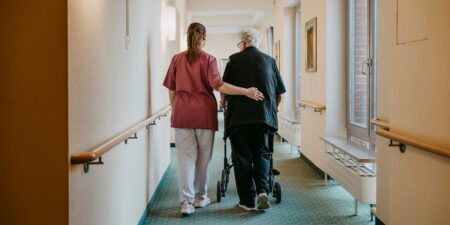Mary Smith is considering bankruptcy.
“I don’t have it,” Smith said, referring to the extra money she would need to afford the higher student-loan payments she’s facing in the coming year. “Everything we’ve done, we’ve done ourselves,” Smith said. “Nobody handed me anything. I didn’t grow up in a rich family. We live paycheck to paycheck, like most of the country.”
The 50-year-old nurse is enrolled in former President Joe Biden’s SAVE plan, an income-driven repayment plan that offers cheaper monthly payments and a shorter timeline to debt relief. The plan is now on its last legs — it has been blocked since July 2024 due to legal challenges, and Trump’s spending law eliminated the plan, replacing it with two less generous options that will go into effect next summer.
In addition, the Trump administration restarted interest charges on SAVE balances on August 1 after a yearlong pause. This means Smith and the 8 million other borrowers enrolled in SAVE can either switch to a new plan and likely face higher monthly payments or remain on SAVE for now and watch their balances grow. Smith said that she asked her servicer for an estimate on her interest charges, and she was told it would be about $468 a month.
“I did vote for Trump,” Smith said, “I am a Trump supporter, but there are a couple of things I don’t really agree with, and this is one of them.”
On the SAVE plan, Smith said her payments were around $150. Federal Student Aid’s loan simulator predicted that her payments could surge to nearly $1,000 off the SAVE plan, which Smith said she “definitely cannot afford.”
Business Insider heard from dozens of student-loan borrowers enrolled in SAVE who are concerned about interest charges restarting and eventually having to move to a different repayment plan. Some borrowers are balancing their agreement with Trump that loans should be repaid with the reality of the financial strain that comes with losing SAVE.
Linda McMahon, Trump’s education secretary, said in a statement announcing the interest charges restart that the administration is focused on “strengthening the student loan portfolio and simplifying repayment to better serve borrowers.”
“As part of this effort, the Department urges all borrowers in the SAVE Plan to quickly transition to a legally compliant repayment plan — such as the Income-Based Repayment Plan,” McMahon said. “Borrowers in SAVE cannot access important loan benefits and cannot make progress toward loan discharge programs authorized by Congress.”
Smith is hoping she’ll be able to cover the interest charges, but she doesn’t have a plan for potentially much higher payments down the road.
“It’s a struggle. I do agree we have to pay them, but it’s really hurting us,” Smith said. “It’s a shame.”
‘A wait and see game’
Justin Krull’s goal is to pay off his student-loan balance. He was never trying to find a way out of repayment, and he wants a concrete plan to fit monthly student-loan payments into his budget. The constantly changing student-loan policies make that difficult.
“We’re not trying to cheat, we’re not trying to not pay our bills,” Krull, 42, told BI. “We want to take care of our responsibilities. We just want a system in place that we can rely on and be able to financially plan for our futures and endeavors that exist out there.”
Krull went back to school in his late 20s on the pre-law track with the goal of earning a law degree, but his priorities changed. He got married and had children, and once the pandemic hit, he lost his job as a retail manager and now works in operations at a factory.
He said he qualified for $0 monthly payments on the SAVE plan, and he’s been unable to get an estimate of his new payment on a different repayment plan. He plans to see how much interest starts building on his balance and determine at that point whether it makes the most sense for him to remain on SAVE and pay off the interest or take action to get on a new plan.
Either way, the uncertainty is taking a toll.
“At this point, I’m playing a wait-and-see game and making the move that makes the most sense financially once I can determine what those finances are going to be,” Krull said. He added that he’s worried he’ll have to scale back on his retirement and health savings should his payments surge.
Alannah is in a similar boat. Working in public health, she said the SAVE plan halved her payments from around $800 a month to just over $400, which allowed her to put more money into savings and put a down payment on a house. The uncertainty with SAVE has been frustrating, she said, because she planned her budget around her lower monthly payments.
Additionally, she heeded the administration’s advice and submitted an application to switch to an income-based repayment plan earlier this year, but she said the application is still processing, keeping her in limbo. The Department of Education also posted a notice that loan forgiveness through IBR plans is paused to comply with a court order.
Alannah said she plans to hold off on making any student-loan payments until she has certainty that the plan she is on will count toward debt relief. She said that if she paid off her loans aggressively, she would run through her savings — and be left with nothing for retirement.
‘Everything right now is backlogged’
The changes to SAVE come as the Department of Education itself is undergoing a major overhaul. Trump signed an executive order earlier this year to begin dismantling the department, and the Supreme Court recently ruled that the agency can proceed with firing 1,400 workers, about half of its staff.
McMahon said following the ruling that it was “a significant win for students and families” and allows the department the ” authority to make decisions about staffing levels, administrative organization, and day-to-day operations.”
Still, it leaves the department with fewer resources to manage major tasks, including creating a new repayment system and processing millions of borrowers’ applications.
It has Holly Atkinson, a 57-year-old nurse who voted for Trump, concerned.
“It’s such a hot mess over there,” Atkinson told BI. “Everything right now is backlogged as it is, and if they lay off these people at the Department of Education, it’s going to make the situation worse.”
Atkinson said she was enjoying low monthly payments on the SAVE plan before it was blocked. With her repayment future up in the air, she’s now unsure if she’ll ever be able to retire with student loans hanging over her head, while also managing a separate private student-loan balance and mortgage payments.
“I just feel like it’s a weight on my shoulder that’s never going to get lifted,” she said. “And I see people my age planning to retire and go on vacations and travel, and I don’t see any of that happening for me.”
The department said it would be communicating with SAVE borrowers over the next few months regarding their options to switch to a new repayment plan. Atkinson wishes there was more clarity upfront.
“I don’t regret voting for him, but what I’m seeing right now makes me very uncomfortable,” Atkinson said. “We’re all in limbo right now, and I don’t like being in limbo.”
Read the full article here
















